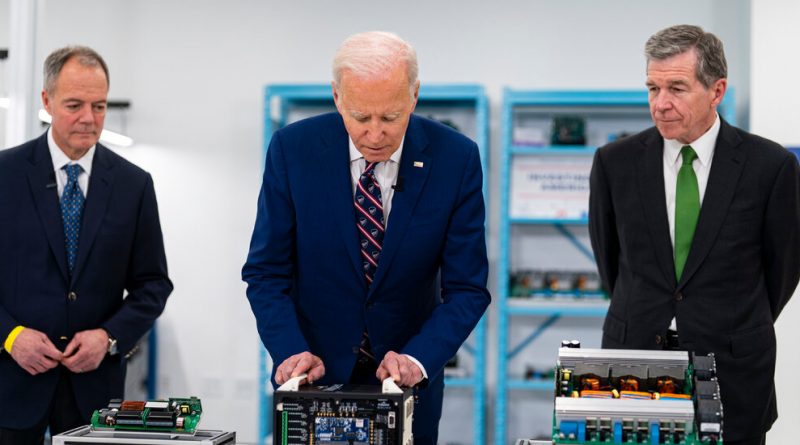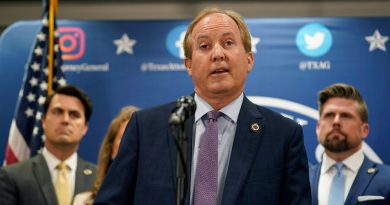Biden Highlights Economic Investments Ahead of Expected 2024 Announcement
DURHAM, N.C. — President Biden visited North Carolina on Tuesday and said Republicans would undermine his administration’s gains on American manufacturing, as the president began to sharpen his political message ahead of an expected re-election announcement.
Mr. Biden spoke at Wolfspeed, a semiconductor manufacturer that recently announced a $5 billion investment to expand operations in the state, a move that would create about 1,800 jobs, according to the White House. The company, based in North Carolina, has deals to supply the material to General Motors, among other buyers.
But Mr. Biden’s visit was less about semiconductors than it was about making an argument that he sees as key to a re-election bid — essentially, that the American economy has recovered since the coronavirus pandemic, his administration has helped keep it strong and Republican policies would undo that progress.
“I’ve got news for you and for MAGA Republicans in Congress: Not on my watch,” Mr. Biden said, referring to the far-right wing of the party that is loyal to former President Donald J. Trump.
The White House has argued for months that Mr. Biden has presided over a steady economy and strong job growth, but the data presents a more complicated reality: The high pace of job creation is undercut by a continued deceleration in wage increases, and there are growing concerns that the Federal Reserve may move to raise interest rates. The Biden administration has also tried to assuage fears of instability after the collapse of Silicon Valley Bank this month.
Understand the U.S. Debt Ceiling
What is the debt ceiling? The debt ceiling, also called the debt limit, is a cap on the total amount of money that the federal government is authorized to borrow via U.S. Treasury securities, such as bills and savings bonds, to fulfill its financial obligations. Because the United States runs budget deficits, it must borrow huge sums of money to pay its bills.
The limit has been hit. What now? America hit its technical debt limit on Jan. 19. The Treasury Department will now begin using “extraordinary measures” to continue paying the government’s obligations. These measures are essentially fiscal accounting tools that curb certain government investments so that the bills continue to be paid. Those options could be exhausted by June.
What is at stake? Once the government exhausts its extraordinary measures and runs out of cash, it would be unable to issue new debt and pay its bills. The government could wind up defaulting on its debt if it is unable to make required payments to its bondholders. Such a scenario would be economically devastating and could plunge the globe into a financial crisis.
Can the government do anything to forestall disaster? There is no official playbook for what Washington can do. But options do exist. The Treasury could try to prioritize payments, such as paying bondholders first. If the United States does default on its debt, which would rattle the markets, the Federal Reserve could theoretically step in to buy some of those Treasury bonds.
Why is there a limit on U.S. borrowing? According to the Constitution, Congress must authorize borrowing. The debt limit was instituted in the early 20th century so that the Treasury would not need to ask for permission each time it had to issue debt to pay bills.
Mr. Biden’s visit to North Carolina was the start of three weeks of related events to be held across the country by the president and Vice President Kamala Harris, plus their spouses and a host of cabinet officials. The group plans to visit 20 states and will highlight investments in American manufacturing, supply chains and job-creation efforts, according to a summary of efforts sent by the White House.
During his trip to Durham, Mr. Biden highlighted legislation passed last year, including the CHIPS and Science Act, which contains $52 billion in subsidies and tax credits for companies that manufacture chips in the United States. More than half of the amount is dedicated to helping companies build facilities for making, assembling and packaging some of the world’s more advanced chips. In his remarks, the president said that over $435 billion had been invested in American companies since he took office.
“America’s coming back,” Mr. Biden said, standing beside Gina Raimondo, the commerce secretary, who traveled with him to Durham. “We are determined to lead the world in manufacturing semiconductors.”
Ms. Raimondo, who is expected to participate in the tour over the coming weeks, told a crowd gathered at Wolfspeed that the pandemic had “opened all of our eyes” to the importance of maintaining the global supply chain and protecting competitive advantages in technology.
“The truth of it is the United States was for a long time a manufacturing powerhouse,” she said. “Still is, but for a long time we took our eye off the ball, and we watched manufacturing leave our shores in search of cheap labor in Asia.”
How Times reporters cover politics. We rely on our journalists to be independent observers. So while Times staff members may vote, they are not allowed to endorse or campaign for candidates or political causes. This includes participating in marches or rallies in support of a movement or giving money to, or raising money for, any political candidate or election cause.
The president spoke directly to people he said might feel “left behind” by technological changes, but said his administration would focus on programs that could train workers to produce technological projects without a college degree. Mr. Biden said the “vast majority” of jobs created by Wolfspeed would not require college degrees and could pay around $80,000.
Events like the one held on Tuesday will provide Mr. Biden and his surrogates with an opportunity to hone his argument against Republicans.
At the same time, a collision course looms in Washington over the debt ceiling.
On Tuesday, Speaker Kevin McCarthy, Republican of California, wrote a letter urging the president to negotiate on the federal debt limit. “With each passing day,” Mr. McCarthy wrote, “I am incredibly concerned that you are putting an already fragile economy in jeopardy by insisting upon your extreme position of refusing to negotiate any meaningful changes to out-of-control government spending.”
More on the Debt Limit
Mr. Biden has said he will refuse to negotiate on the debt limit, pointing out that Republicans voted to raise the ceiling several times under his predecessor, Mr. Trump.
“It’s time for Republicans to stop playing games, pass a clean debt ceiling bill and quit threatening our economic recovery,” Karine Jean-Pierre said in a statement responding to Mr. McCarthy’s letter.
In his own letter sent on Tuesday evening, Mr. Biden urged Mr. McCarthy and congressional Republicans to present a full budget proposal before Congress leaves for Easter recess.
The president and his advisers have signaled that the situation would be worse under Republican leadership, a point he underscored in North Carolina. The White House says that companies have made $16 billion in private sector investment commitments since Mr. Biden took office, a development they have attributed to corporations taking advantage of tax breaks and federal funding that bolsters innovation.
Mr. Biden has argued that the flow of money would be at stake if Republicans tried to repeal policies passed under his administration, including the Inflation Reduction Act. He has also said that individual Americans are at risk of losing access to lower health care, energy and internet costs that are provided for in the bills that were passed by a Democratic-majority Congress.
“We’re not going to let them undo all the progress,” Mr. Biden said.
Source: Read Full Article



